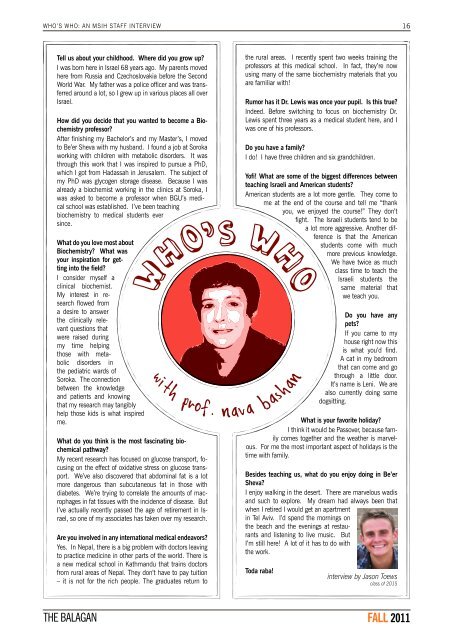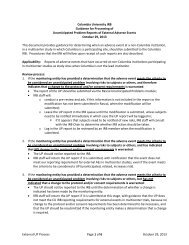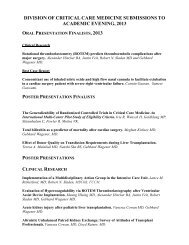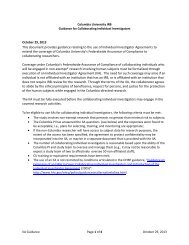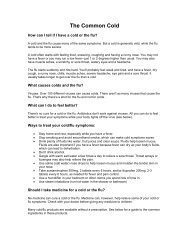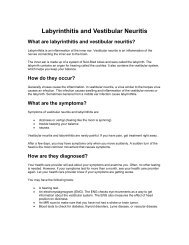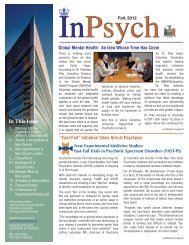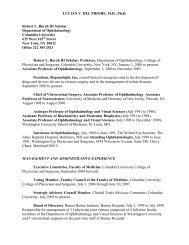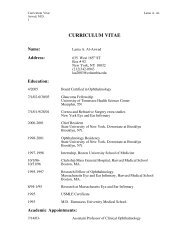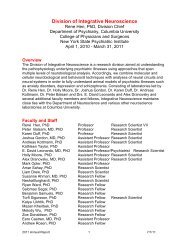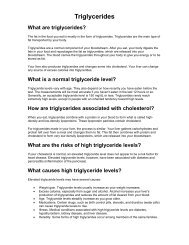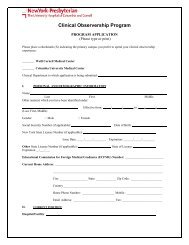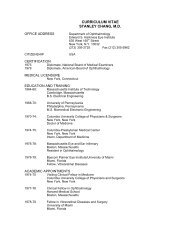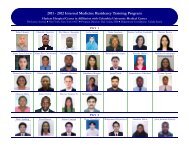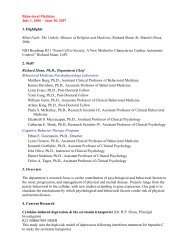FALL2011 - Columbia University Medical Center
FALL2011 - Columbia University Medical Center
FALL2011 - Columbia University Medical Center
Create successful ePaper yourself
Turn your PDF publications into a flip-book with our unique Google optimized e-Paper software.
WHO’S WHO: AN MSIH STAFF INTERVIEW<br />
Tell us about your childhood. Where did you grow up?<br />
I was born here in Israel 68 years ago. My parents moved<br />
here from Russia and Czechoslovakia before the Second<br />
World War. My father was a police officer and was transferred<br />
around a lot, so I grew up in various places all over<br />
Israel.<br />
How did you decide that you wanted to become a Biochemistry<br />
professor?<br />
After finishing my Bachelor’s and my Master’s, I moved<br />
to Be’er Sheva with my husband. I found a job at Soroka<br />
working with children with metabolic disorders. It was<br />
through this work that I was inspired to pursue a PhD,<br />
which I got from Hadassah in Jerusalem. The subject of<br />
my PhD was glycogen storage disease. Because I was<br />
already a biochemist working in the clinics at Soroka, I<br />
was asked to become a professor when BGU’s medical<br />
school was established. I’ve been teaching<br />
biochemistry to medical students ever<br />
since.<br />
What do you love most about<br />
Biochemistry? What was<br />
your inspiration for getting<br />
into the field?<br />
I consider myself a<br />
clinical biochemist.<br />
My interest in research<br />
flowed from<br />
a desire to answer<br />
the clinically relevant<br />
questions that<br />
were raised during<br />
my time helping<br />
those with metabolic<br />
disorders in<br />
the pediatric wards of<br />
Soroka. The connection<br />
between the knowledge<br />
and patients and knowing<br />
that my research may tangibly<br />
help those kids is what inspired<br />
me.<br />
What do you think is the most fascinating biochemical<br />
pathway?<br />
My recent research has focused on glucose transport, focusing<br />
on the effect of oxidative stress on glucose transport.<br />
We’ve also discovered that abdominal fat is a lot<br />
more dangerous than subcutaneous fat in those with<br />
diabetes. We’re trying to correlate the amounts of macrophages<br />
in fat tissues with the incidence of disease. But<br />
I’ve actually recently passed the age of retirement in Israel,<br />
so one of my associates has taken over my research.<br />
Are you involved in any international medical endeavors?<br />
Yes. In Nepal, there is a big problem with doctors leaving<br />
to practice medicine in other parts of the world. There is<br />
a new medical school in Kathmandu that trains doctors<br />
from rural areas of Nepal. They don’t have to pay tuition<br />
– it is not for the rich people. The graduates return to<br />
THE BALAGAN<br />
with prof. nava bashan<br />
the rural areas. I recently spent two weeks training the<br />
professors at this medical school. In fact, they’re now<br />
using many of the same biochemistry materials that you<br />
are familiar with!<br />
Rumor has it Dr. Lewis was once your pupil. Is this true?<br />
Indeed. Before switching to focus on biochemistry Dr.<br />
Lewis spent three years as a medical student here, and I<br />
was one of his professors.<br />
Do you have a family?<br />
I do! I have three children and six grandchildren.<br />
Yofi! What are some of the biggest differences between<br />
teaching Israeli and American students?<br />
American students are a lot more gentle. They come to<br />
me at the end of the course and tell me “thank<br />
you, we enjoyed the course!” They don’t<br />
fight. The Israeli students tend to be<br />
a lot more aggressive. Another difference<br />
is that the American<br />
students come with much<br />
more previous knowledge.<br />
We have twice as much<br />
class time to teach the<br />
Israeli students the<br />
same material that<br />
we teach you.<br />
Do you have any<br />
pets?<br />
If you came to my<br />
house right now this<br />
is what you’d find.<br />
A cat in my bedroom<br />
that can come and go<br />
through a little door.<br />
It’s name is Leni. We are<br />
also currently doing some<br />
dogsitting.<br />
What is your favorite holiday?<br />
I think it would be Passover, because family<br />
comes together and the weather is marvelous.<br />
For me the most important aspect of holidays is the<br />
time with family.<br />
Besides teaching us, what do you enjoy doing in Be’er<br />
Sheva?<br />
I enjoy walking in the desert. There are marvelous wadis<br />
and such to explore. My dream had always been that<br />
when I retired I would get an apartment<br />
in Tel Aviv. I’d spend the mornings on<br />
the beach and the evenings at restaurants<br />
and listening to live music. But<br />
I’m still here! A lot of it has to do with<br />
the work.<br />
Toda raba!<br />
interview by Jason Toews<br />
class of 2015<br />
16<br />
FALL 2011


